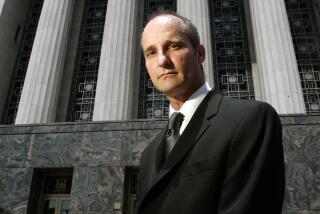Mistrial Hearing for ‘Pot Guru’ Put Off
- Share via
SAN FRANCISCO — Ed Rosenthal, the self-appointed “guru of ganja” who was convicted of three felonies in a medical marijuana case two months ago, returned to the courtroom Tuesday in hopes of winning a mistrial.
Instead, his hearing was postponed for a week after a key witness surprised even the judge by invoking her 5th Amendment rights against self-incrimination.
Defense attorneys had called a hearing to try to establish misconduct by the jurors who found Rosenthal guilty of cultivating marijuana and conspiracy in January.
Four days after the conviction, however, four jurors held a news conference, tearfully apologizing to Rosenthal and complaining that they were prevented from learning that he was growing the marijuana for medicinal purposes as a supplier authorized by the Oakland city government.
Rosenthal’s lawyers and supporters had hoped that Marney Craig, a juror, would testify that she had sought advice from a lawyer and shared that advice with another juror during Rosenthal’s trial.
If that discussion among jurors or with the outside attorney influenced the juror’s deliberations or prejudiced her state of mind, that could be considered “extra-judicial” information and grounds for a mistrial, defense lawyers said.
When Craig quietly delivered her testimony Tuesday, she said she had befriended fellow juror Pamela Klarkowski, and that they had occasionally carpooled to the trial together. But when asked if she had discussed the trial with Klarkowski, she took the 5th Amendment.
Craig’s lawyer, Mary McNamara, said she would advise Craig to continue to invoke her right to remain silent unless the government granted her immunity.
“This comes as a surprise,” said U.S. District Judge Charles Breyer, who presided over Rosenthal’s trial.
Klarkowski testified that when she and Craig drove home from the trial one day, Craig had turned to her with a critical question. “I remember Marney saying, ‘When juries come up with a verdict, do they have to follow the law, or can they make their decision based on conscience?’ ” Klarkowski recounted. “She said, ‘I have an attorney friend I’d like to call on this point of law ... ‘ Then I said, ‘Well, if you do find anything out, let me know.’ ”
Klarkowski testified that on another day, in the presence of a third juror, she asked Craig whether she had consulted the attorney.
“She said, ‘We must do what we were instructed,’ ” Klarkowski testified. “I felt there was only one choice. Given all the instructions of the court, given all the evidence presented by the prosecution, which was pretty tidy, I thought, ‘That’s it.’ ”
In 1996, California voters passed a referendum allowing use of marijuana for medicinal purposes with a prescription. But the U.S. Supreme Court ruled in 2001 that the drug’s classification as illegal also applies to medical patients, pitting federal law against state law.
The hearing will resume Tuesday.
More to Read
Sign up for Essential California
The most important California stories and recommendations in your inbox every morning.
You may occasionally receive promotional content from the Los Angeles Times.













